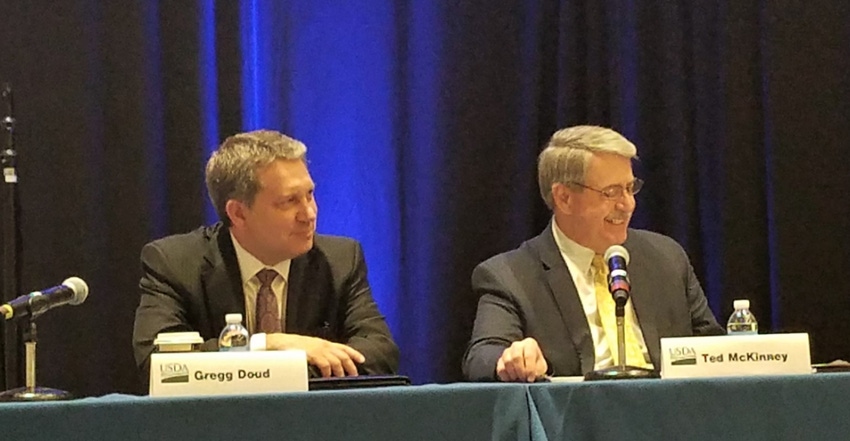Ag trade champions work to advance U.S. ag
USDA trade undersecretary McKinney hard at work as service department for U.S. agricultural markets.

Rest assured that as the many trade negotiations continue with partners around the world, agriculture’s voice continues to be heard.
Ted McKinney, U.S. Department of Agriculture undersecretary for trade, noted in his comments at the USDA Agricultural Outlook Forum that help is on the horizon in the ongoing pinch farmers are facing on the trade front. “We cannot land USMCA [U.S.-Mexico-Canada Agreement] fast enough. If we can take down [Section] 232 barriers, that helps a lot, and if we can get [a bilateral trade deal with] Japan done sooner than later, that helps too. China is a wild card,†McKinney said, but if those large markets and issues get landed, it will help tremendously.
McKinney said it isn’t easy to look at your friends and say, “We don’t like the way you’re behaving. We are in a time where we are revisiting to have free, fair and reciprocal trade.†McKinney is one of a handful of those in the Trump Administration who have had to take the tough position of defending farmers while also defending actions that have brought about pain.
McKinney said the cooperation between the U.S. Trade Representative and USDA is seamless. “Many people don’t know this, but at any given negotiation, USDA and my team will have two to 20 people doing backroom analysis,†he shared. Although USTR has an outstanding team, he noted that “they don’t have that bench strength†to offer the needed in-depth analysis of crunching the numbers and offering counterproposals in terms of reviewing proposals’ impact on agriculture.
McKinney often sits side by side during negotiations with USTR chief agricultural negotiator Gregg Doud, who’s charged by law to lead the negotiations. It’s not uncommon during a negotiation that McKinney said he’ll speak up about something on which he has more expertise, especially as he draws from his own experience in the private sector.
“We’re there to support and do whatever we can to bring home a very successful negotiation,†he said.
While speaking together at the USDA Agricultural Outlook Forum on Feb. 21, Doud compared their relationship to a used car salesman -- himself -- and the service department -- McKinney. Doud helps make the big sales, while McKinney and his team continue to make sure everything runs properly. McKinney said many times he also flies solo to countries around the world to do the “maintenance work†of keeping other countries playing by the rules and building trust.
McKinney said many regulatory bodies – such as the World Organization for Animal Health, Codex and World Trade Organization – help guide discussions. He noted, “We’ve got to follow rules. If we don’t follow rules, what do we have but this massive free-for-all?â€
The Generalized Systems of Preference offers a “hand-up, not a handout,†for developing countries to promote economic growth in the developing world by providing preferential duty-free entry for certain products. Yet, McKinney said he found that some have taken this for granted. “If a country continues to give us the shaft and send all the business to someone else yet still demands millions to billions, well, we’ve got to revisit those decisions, and we are,†McKinney said.
He said there’s an image that the U.S. is just a bunch of rich people where money flows, so if someone takes a little more from us than they should, then it doesn’t matter. â�€œI have discovered that there is a fear of the U.S. -- our size, our scope, our prowess.†However, as he shares about the human level, especially how U.S. farmers are now in the sixth year of a very depressed economy, that helps create a different picture with world trading partners.
China efforts
Doud said the biggest WTO case in history is over China’s domestic supports for wheat, rice and cotton. “We think China exceeded what it is allowed to do by $80-100 billion,†he said. He expects to see the results of the WTO case “very soon,†which could play an important role in the ongoing China trade talks.
“We have a lot of problems in our relationship with China,†Doud said, adding that the goal remains to increase market access for U.S. agricultural products.
China had become a great market for soybeans, but the goal is to figure out a way to open up China for all these other commodities. “That’s exactly what we’re trying to do,†Doud said, adding that China currently only allows for access to a “thimbleful of beef†and no access for poultry. Dried distillers and grains, pet food and ethanol all have massive duties.
Doud noted that there is a vast opportunity for expansion, as China imported a total of $124 billion. USTR reported that U.S. exports of agricultural products to China totaled $20 billion in 2017, the second-largest agricultural export market. Leading domestic export categories include: soybeans ($12 billion), cotton ($978 million), hides and skins ($945 million), coarse grains like corn ($839 million) and pork/pork products ($662 million).
After nearly three months of negotiations, President Donald Trump and China's President Xi Jinping could not reach a conclusion ahead of the March 1 deadline but have agreed to extend the deadline while talks continue. Reports indicate that negotiators are closing in on as many as six separate agreements, including one on agriculture. According to reports, China is proposing to buy an additional $30 billion a year in U.S. agricultural products as part of the possible deal. A currency deal has also been reported. Late Friday, Secretary of Agriculture Sonny Perdue said China committed to buying 10 million metric tons of U.S. soybeans.
For a one-on-one interview with McKinney on the sidelines of the USDA Agricultural Outlook Forum, click on the audio link below.
About the Author(s)
You May Also Like





